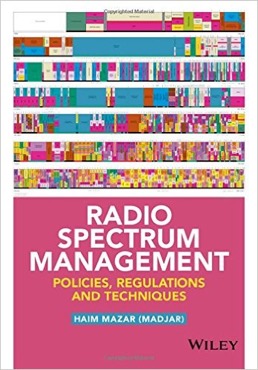Great Book on Spectrum Policy
18 12, 16 12:06 Filed in: spectrum management
There aren't many serious books on spectrum policy for either class instruction or for a reference for professionals. Haim Mazar, formerly of the Israeli national spectrum regulator and a veteran of ITU deliberations has done a great service by writing such a book. Before the book came out, I heard positive comments about him from both an FCC staffer who frequently participated in ITU activities and his counterpart from a nearby Arab country who had dealt with him on regional spectrum issues.
While it has a good section on many of the technical aspects of spectrum policy (Chapter 5 - RF Engineering and Link Budget), the non engineer can set that aside for review as needed. However, the wireless engineering program that wants to use this for a textbook will find that the chapter adds a key part of technical anises that is not normally addressed in electrical engineering education. Many such engineering programs take spectrum policies as coming direct from Mt. Sinai and being immutable. Rather this section shows how technical rules are developed from physical phenomena and estimates of reasonable radio equipment performance which inevitably varies with both equipment cost and progress in technology. A whole chapter is devoted to ITU issues and the parallel recent role of standards development organizations/SDOs. There is a good discussion of the goals of national spectrum management followed by more detail on regulatory arrangements in China, France, UK, and US.
A final chapter on RF safety is more technical than the rest of the book but is a convenient reference to have around when the topic comes up.
While there is discussion of radio propagation in Chapter 5, the focus is on traditional bands and nothing is said about the current "spectrum frontier" of millimeter waves and how the propagation there is so different than the lower traditional bands. But, then again, most spectrum management controversies involved these lower bands. and they will be the interest of most readers. But with that limitation it does an excellent job covering many different aspects of this interdisciplinary field.
While it has a good section on many of the technical aspects of spectrum policy (Chapter 5 - RF Engineering and Link Budget), the non engineer can set that aside for review as needed. However, the wireless engineering program that wants to use this for a textbook will find that the chapter adds a key part of technical anises that is not normally addressed in electrical engineering education. Many such engineering programs take spectrum policies as coming direct from Mt. Sinai and being immutable. Rather this section shows how technical rules are developed from physical phenomena and estimates of reasonable radio equipment performance which inevitably varies with both equipment cost and progress in technology. A whole chapter is devoted to ITU issues and the parallel recent role of standards development organizations/SDOs. There is a good discussion of the goals of national spectrum management followed by more detail on regulatory arrangements in China, France, UK, and US.
A final chapter on RF safety is more technical than the rest of the book but is a convenient reference to have around when the topic comes up.
While there is discussion of radio propagation in Chapter 5, the focus is on traditional bands and nothing is said about the current "spectrum frontier" of millimeter waves and how the propagation there is so different than the lower traditional bands. But, then again, most spectrum management controversies involved these lower bands. and they will be the interest of most readers. But with that limitation it does an excellent job covering many different aspects of this interdisciplinary field.
blog comments powered by Disqus




![Validate my RSS feed [Valid RSS]](valid-rss-rogers.png)

